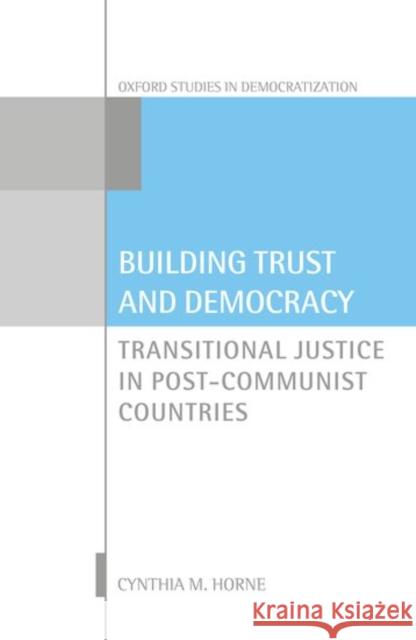Building Trust and Democracy: Transitional Justice in Post-Communist Countries » książka
topmenu
Building Trust and Democracy: Transitional Justice in Post-Communist Countries
ISBN-13: 9780198793328 / Angielski / Twarda / 2017 / 400 str.
This volume explores the effects of transitional justice measures on trust-building and democratization across twelve countries in Central and Eastern Europe and parts of the Former Soviet Union over the period 1989-2012.
The author argues that transitional justice measures have a differentiated impact on political and social trust building, supporting some aspects of political trust and undermining other aspects of social trust. Moreover, the structure, scope, timing, and implementation of transitional justice measures condition outcomes. More expansive and compulsory institutional change mechanisms register the largest effects, with limited and voluntary change mechanisms having a diminished effect, and more informal and largely symbolic measures having the most attenuated effect. These differentiated and conditional effects are also evident with respect to transition goals like supporting democratic consolidation and reducing corruption, since these goals respond differently to the mixtures of institutional and symbolic reforms found in transitional justice programs. The author develops an original transitional justice typology focusing on the degree to which lustration measures, public disclosure procedures, and file access provisions are expansive and compulsory, limited and voluntary, largely informal and symbolic, or actively rejected. Using this typology, the author categorizes post-communist countries according to the scope and implementation of their measures in order to test hypotheses linking trust building and transitional justice across twelve cases in the region. The resulting new datasets allow for a quantitative examination of the relationship between different types of transitional justice programs and a range of possible state building and societal reconciliation goals, including political trust building, social trust building, democratization, the strengthening of civil society, the promotion of government effectiveness, and the reduction of corruption. Comparative case studies of four transitional justice programs-Hungary, Romania, Poland, and Bulgaria-- draw on field work, primary and historical documents, and interview materials to explicate trust-building dynamics, with particular attention to regime complicity challenges, historical memory issues, and communist legacies. Oxford Studies in Democratization is a series for scholars and students of comparative politics and related disciplines. Volumes concentrate on the comparative study of the democratization process that accompanied the decline and termination of the cold war. The geographical focus of the series is primarily Latin America, the Caribbean, Southern and Eastern Europe, and relevant experiences in Africa and Asia. The series editor is Laurence Whitehead, Senior Research Fellow, Nuffield College, University of Oxford.










